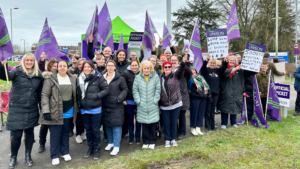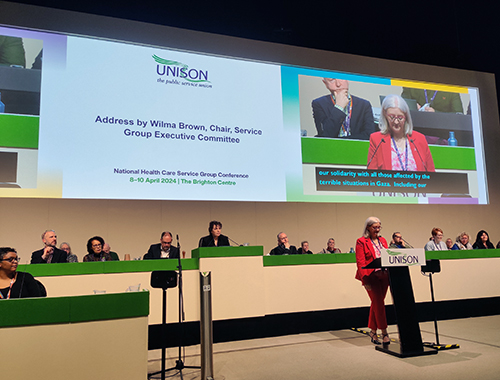Hundreds of hospital workers in the South West are celebrating victory after NHS and Sodexo respectively committed to paying the lump sum bonuses due to them.
The one-off payment, part of a deal agreed for all staff on NHS contracts and Agenda for Change, is worth at least £1,655 for full-time health workers.
Wiltshire
Staff at Wiltshire’s six community hospitals had taken two days of strike action (pictured above) over the company’s previous refusal to honour the payment, already given to health workers employed directly by the NHS in June 2022.
Wiltshire Health and Care initially said it could not afford to pay the workers. After pressure from UNISON members, Wiltshire Health and Care successfully applied for funding from the Department of Health and Social Care.
Wiltshire Health and Care is a Limited Liability Partnership, created in 2014 by three NHS trusts – Great Western Hospitals NHS Foundation Trust, Royal United Hospitals Bath NHS Foundation Trust, and Salisbury NHS Foundation Trust.
North Devon
In North Devon, staff employed by Sodexo took two days of strike action (pictured below) in February over the company’s previous refusal to honour the payment.

Sodexo workers picketing in North Devon
In response, Sodexo offered to pay 80% of the sum while they awaited news on their application to the Department of Health and Social Care for the remaining 20%. UNISON members voted to suspend planned action for March and accepted their offer.
Sodexo’s successful application to the Department of Health and Social Care now means that over 300 workers will receive the final 20% of the lump sum in their April pay packet.
UNISON South West regional secretary Kerry Baigent said: “This is a victory for hundreds of low-paid health workers. These workers shouldn’t have had to go on strike and lose money to win the cash that’s rightfully theirs.
Speaking of the victory in Wiltshire, Ms Baigent said: “The three Trusts should have done more to ensure that Wiltshire Health and Care workers received the lump sum at the same time as their directly employed staff. Health workers employed by private firms shouldn’t be treated less favourably or earn less an hour only because they no longer work for the NHS.”
In regard to workers in North Devon, she said: “Hundreds of staff standing on the picket line created pressure that focused the minds of Sodexo executives and resulted in staff accepting an offer for 80% of the lump sum. Now, after this decision, they’ll be getting 100%.
“But Sodexo generates huge profits and had the ability to pay its staff all along. It could have easily avoided these strikes.
“In 2025, Sodexo’s contract for the service is up for renewal. It’s time our members are brought back in house alongside their NHS colleagues where they belong.”
The article Health workers in South West celebrate double lump-sum victory first appeared on the UNISON National site.
